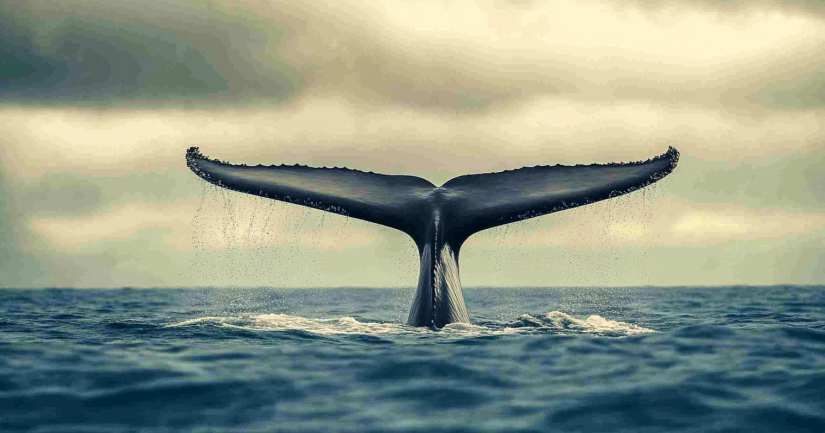
Whale Quiz , Test Your Knowledge of the Ocean’s Gentle Giants! Towering beneath the waves and migrating across entire oceans, whales are some of the largest, most intelligent, and awe-inspiring creatures on Earth. These majestic marine mammals range from the massive blue whale, the largest animal to have ever lived, to the acrobatic humpback whale, known for its mesmerizing songs and breaching displays. Whales play a vital role in marine ecosystems, helping regulate the ocean’s carbon cycle and supporting biodiversity. But how much do you really know about these ocean giants? Take our Whale Quiz and find out!
Whales belong to the cetacean family, which includes toothed whales (Odontoceti) and baleen whales (Mysticeti). Unlike fish, whales are mammals, meaning they breathe air, nurse their young, and are warm-blooded.
Whales are awe-inspiring, but there’s so much more to explore! Explore the hardy walrus in our Walrus Trivia or learn more about another gentle ocean giant in our Humpback Whale Trivia.
What Makes Whales So Unique?
- Baleen whales (like blue whales and humpbacks) filter-feed using comb-like baleen plates to capture krill and small fish.
- Toothed whales (like orcas and sperm whales) have sharp teeth and use echolocation to hunt squid and fish.
The Blue Whale Is the Largest Animal to Ever Live – Reaching lengths of over 100 feet (30 meters) and weighing up to 200 tons, blue whales are even bigger than the largest dinosaurs!
Whales Can Sing and Communicate Over Vast Distances – Humpback whales are known for their complex songs, while sperm whales use clicking sounds to communicate hundreds of miles away.
They Have the Biggest Brains in the Animal Kingdom – Sperm whales have the largest brain of any animal, weighing up to 20 pounds (9 kg)!
Some Whales Can Hold Their Breath for Over an Hour – Sperm whales dive to extreme depths, staying underwater for up to 90 minutes in search of squid.
Mind-Blowing Whale Facts That Might Surprise You
Whales Play a Huge Role in the Ocean’s Ecosystem – Their nutrient-rich feces help stimulate plankton growth, which supports marine food webs and helps absorb carbon dioxide from the atmosphere.
Orcas Are Actually Dolphins, Not Whales – Despite being called “killer whales,” orcas belong to the dolphin family and are among the most intelligent marine predators.
They Migrate Thousands of Miles Each Year – Gray whales undertake one of the longest migrations of any mammal, traveling over 10,000 miles (16,000 km) annually between feeding and breeding grounds.
Narwhals Are the “Unicorns of the Sea” – Their long, spiraled tusk is actually a tooth that can grow over 10 feet (3 meters) long and is packed with sensory nerves.
Some Whales Can Live for Over 200 Years – The bowhead whale is one of the longest-living mammals, with some individuals estimated to be over two centuries old.
They Are Threatened by Climate Change and Human Activity – Whales face dangers from ocean pollution, ship strikes, entanglement in fishing gear, and climate change, making conservation efforts crucial for their survival.
The Role of Whales in Marine Ecosystems
Whales are essential to ocean health. Their massive migrations help transport nutrients across the seas, and their feeding behaviors contribute to marine biodiversity. However, whaling, plastic pollution, and global warming have had devastating effects on some whale populations. Conservationists work hard to protect whale habitats, implement whale-safe fishing practices, and promote sustainable tourism.
Are You Ready to Take the Ultimate Whale Quiz?
If you love marine life, ocean conservation, or just admire these magnificent creatures, this Whale Quiz is for you! Whether you’re fascinated by blue whales, orcas, narwhals, or deep-diving sperm whales, this quiz will challenge your knowledge and reveal amazing facts about these intelligent and gentle giants.
So, are you ready to test your knowledge and dive into the world of whales? Take the Whale Quiz now and see if you’re a true cetacean expert! 🌊🐋
Love the ocean? Test your knowledge with the Guess the Sea Animal Quiz, discover your marine match in the What Sea Animal Am I Quiz, or explore more Marine Quizzes for underwater fun!
Whale – FAQ
Whales are large marine mammals belonging to the order Cetacea, which includes both whales and dolphins. They are further classified into two main groups: baleen whales, which filter feed using baleen plates, and toothed whales, which have teeth and primarily hunt for food. Whales are known for their impressive size, complex behaviors, and social structures.
Whales have diverse diets depending on their species. Baleen whales primarily consume small organisms such as krill and plankton, using their baleen to filter food from the water. Toothed whales, on the other hand, may eat fish, squid, and even other marine mammals. They use echolocation to locate and capture their prey, showcasing their remarkable adaptation to life in the ocean.
Whales are found in oceans worldwide, from polar regions to tropical waters. Many species exhibit migratory behavior, traveling thousands of miles between feeding and breeding grounds. For instance, humpback whales migrate annually from feeding areas in colder waters to breeding grounds in warmer regions, demonstrating their incredible endurance and navigational skills.
Whales are threatened by various human activities, including commercial whaling, habitat loss, pollution, and climate change. Ship strikes and entanglement in fishing gear also pose significant risks. Conservation efforts are crucial to protect whale populations and their habitats, ensuring their survival for future generations.
Individuals can play a vital role in whale conservation by supporting organizations dedicated to marine protection, reducing plastic use, and advocating for sustainable fishing practices. Additionally, participating in responsible whale watching and promoting awareness about the importance of ocean health can help safeguard these magnificent creatures and their ecosystems.
